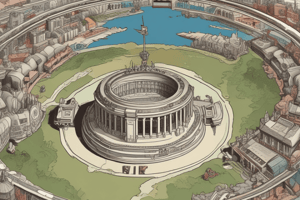Podcast
Questions and Answers
What is the definition of democracy?
What is the definition of democracy?
A system of government where power is held by the people, either directly or through elected representatives
What is direct democracy?
What is direct democracy?
A type of democracy where citizens make decisions directly, often through votes or referendums
What is the principle of sovereignty of the people?
What is the principle of sovereignty of the people?
Power resides with the people
What is the principle of equality in democracy?
What is the principle of equality in democracy?
What is a characteristic of democratic systems?
What is a characteristic of democratic systems?
What is authoritarianism?
What is authoritarianism?
What is corruption in the context of democracy?
What is corruption in the context of democracy?
What is populism in the context of democracy?
What is populism in the context of democracy?
What is the principle of protection of minority rights?
What is the principle of protection of minority rights?
What is the importance of access to information in a democracy?
What is the importance of access to information in a democracy?
Flashcards are hidden until you start studying
Study Notes
Definition and Types of Democracy
- Democracy: a system of government where power is held by the people, either directly or through elected representatives
- Types of democracy:
- Direct democracy: citizens make decisions directly, often through votes or referendums
- Representative democracy: citizens elect representatives to make decisions on their behalf
- Participatory democracy: citizens participate in decision-making through various means, such as community assemblies
Key Principles of Democracy
- Sovereignty of the people: power resides with the people
- Equality: all citizens have equal rights and opportunities
- Freedom: citizens have the right to express themselves and participate in the political process
- Accountability: those in power are accountable to the people
- Protection of minority rights: the rights of minorities are protected from the will of the majority
Characteristics of Democratic Systems
- Free and fair elections: regular elections are held to ensure representation and accountability
- Separation of powers: power is divided among legislative, executive, and judicial branches to prevent abuse
- Independence of the judiciary: the judiciary is independent and impartial
- Freedom of speech and assembly: citizens have the right to express themselves and assemble peacefully
- Access to information: citizens have access to information about the government and its actions
Challenges to Democracy
- Authoritarianism: the concentration of power in the hands of a few individuals or groups
- Corruption: the abuse of power for personal gain
- Populism: the exploitation of popular sentiment to undermine democratic institutions
- Polarization: the erosion of common ground and the exacerbation of divisions within society
Definition and Types of Democracy
- A system of government where power is held by the people, either directly or through elected representatives
- Three types of democracy: direct, representative, and participatory
- Direct democracy: citizens make decisions directly, often through votes or referendums
- Representative democracy: citizens elect representatives to make decisions on their behalf
- Participatory democracy: citizens participate in decision-making through various means, such as community assemblies
Key Principles of Democracy
- Sovereignty of the people: power resides with the people
- Equality: all citizens have equal rights and opportunities
- Freedom: citizens have the right to express themselves and participate in the political process
- Accountability: those in power are accountable to the people
- Protection of minority rights: the rights of minorities are protected from the will of the majority
Characteristics of Democratic Systems
- Free and fair elections: regular elections are held to ensure representation and accountability
- Separation of powers: power is divided among legislative, executive, and judicial branches to prevent abuse
- Independence of the judiciary: the judiciary is independent and impartial
- Freedom of speech and assembly: citizens have the right to express themselves and assemble peacefully
- Access to information: citizens have access to information about the government and its actions
Challenges to Democracy
- Authoritarianism: the concentration of power in the hands of a few individuals or groups
- Corruption: the abuse of power for personal gain
- Populism: the exploitation of popular sentiment to undermine democratic institutions
- Polarization: the erosion of common ground and the exacerbation of divisions within society
Studying That Suits You
Use AI to generate personalized quizzes and flashcards to suit your learning preferences.




